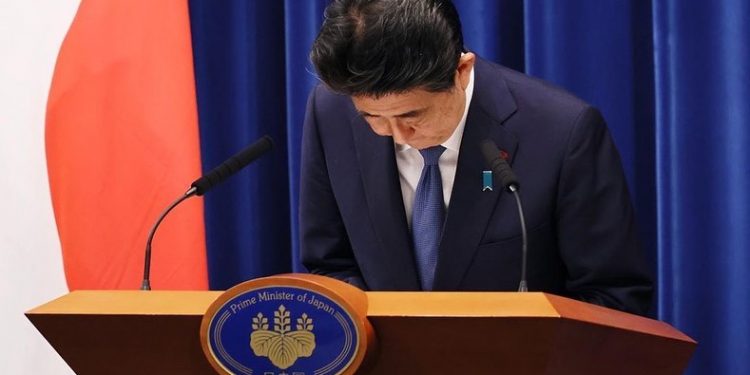Japan’s longest serving prime minister, Shinzo Abe, announced his departure from office last Friday, citing his health as the main problem. His abrupt resignation sent shock waves throughout the world, especially Japan as they ponder about the great strides Japan has taken since Abe’s presidency. Throughout the 8 years in power, this premier has rendered a paradigm shift in the Japanese society through its economic, political and social reforms.
Commentators have noted that his loss of popularity as a prime minister in recent months was also the prime reason he is deciding to leave after serving Japan for many years. Despite having steady support from its citizens for seven years, Abe saw a steady decrease in support for his cabinet in 2020.
When the pandemic swept in, Abe was criticised for the way he handled the whole situation.
Who is Shinzo Abe?
Abe, 65 was initially elected to Parliament in 1993 after the death of his father, who was a foreign minister. However, he only started serving as a prime minister in 2006, but stepped down the following year after a scandal broke out.
In 2012, Abe became the country’s leader once again where he made key promises such as fixing the besieged Japanese economy and also amending Japan’s pacifist constitution, which will allow for a full-fledged military.
Abe first exited the office in 2007, after nearly serving for eight years due to his ailing health — a relapse of a bowel disease.
Throughout his time at office, Abe’s presence has definitely left an indelible mark on Japan’s defence policies and economy. Not only that, he also managed to maintain high profile relationships with foreign allies from all over the world.
However, Abe has said that he will continue to serve as a prime minster until his successor is chosen.
Here is a walk-through of Shinzo Abe’s prominent legacy.
International Policy
Since coming into power for the second time, Abe has changed its international affairs approach. The highly contested Yasukuni Shrine which was dedicated towards war casualties ruffled the feathers of regional countries like China and South Korea. Although Abe visited the shrine in 2013, which created much public outcry, he has thoroughly refrained from visiting the shrine, knowing all too well that it will sour the relationship with South Korea — a huge departure from his predecessors. Similarly, Abe has radically changed the interpretation of Article 9 constitution, which originally renounced the right to go to war. Instead, the reinterpretation of Article 9 allowed Japanese forces to fight alongside overseas allies, drawing condemnation from China and South Korea while simultaneously receives blessings from U.S. This move has allowed U.S. to continue developing good relationships with Japan.
While regional countries like China continue to drive a wedge with the hegemon U.S., Japan under Abe has made great investments in forging closer relationship with President Donald Trump to benefit from economic investments such as trade. For example, Abe has hosted President Donald Trump in high-profile summits in Japan. Their intimate relationship, as seen in their close interactions through 32 phone calls and 5 rounds of golf, has allowed Abe to pursue Japan’s interests such as keeping the Trans-Pacific Partnership alive even after America’s withdrawal.
Domestic Policy
Aside from international or political affairs, Abe has also managed to move Japan’s society towards an inclusive and diverse one with an open market that embraces migration into Japan. He has reformed unproductive corporate culture by creating a new form of corporate governance code and investor stewardship code that aims to increase shareholder control and profitability. Meanwhile, the power of the traditionalist managers weakens. Additionally, Abe has also sought to punish the toxic corporate culture where workers had to endure unproductive overtime hours. Of particular importance, while his party had long resisted Japan’s movement towards gender equality and immigration, Abe has nudged companies to hire more women and minimise gender inequality through the provision of funded daycare centers, encouraging more men to take paternity leave as well as provide companies incentives if they hire women.
Economic policy
Abe will leave behind his biggest legacy, Abenomics, which was aimed to curb the threats of deflation and an aging work force through fiscal spending, corporate deregulation, and cheap cash.
Abenomics delivered great results in the early years of Abe’s term which lifted Japan’s economy immensely and at the same time, lifting Abe’s profile as a prime minister. However, in 2019, the steady growth suffered due to the trade war between United States and China. It then took a further downfall when the pandemic hit Japan, causing its economy to hit a slump.
Who will take over Abe?
Certainly, Abe has done pretty well in his political and public policy approach during his 8-year long term. However, Abe has not groomed a successor during this time, and this creates anxiety for Japan; some scholars have argued that with Abe stepping down, Abe’s rival, Shigeru Ishiba who is the most popular politician will take over. What lays ahead for Japan and its society? It would be tough for the next prime minister to match Abe’s legacy on economic, political, and social policies where he brought the country out of recession and diversified Japan’s labour force.
Ishiba will have a tough challenge ahead as it tries to win the support of its party members as well as Abe’s party who regards him as a political foe. With this tussle ahead of him, one wonders his plans for the future and if he is able to charismatically deliver policies despite the constant tension within the cabinet.












